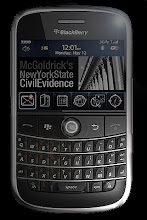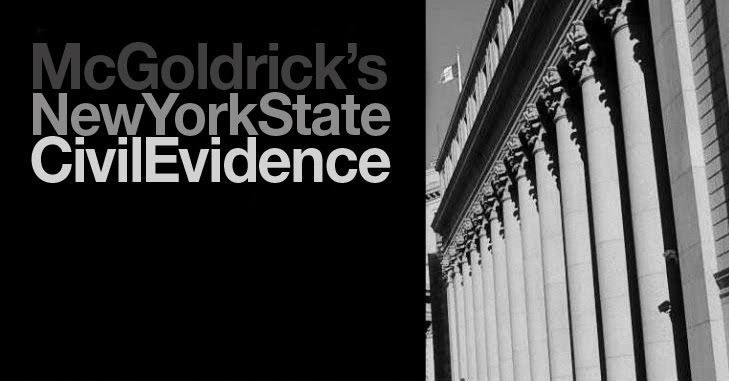The Court of Appeals examined a question faced often by counsel in matters where the existence of a defendant's liability insurance is at risk of being raised when examining a witness as to his or her interest in a liability insurance carrier connected to the defendant. The Court of Appeals found that the Supreme Court, in a dental malpractice jury trial, had not erred in allowing defendant's motion to preclude plaintiff's counsel's cross-examination of an expert witness as to his shareholding in the defendant dentist's malpractice liability insurer in Salm v Moses 2009 NY Slip Op 07479.
In granting the defendant's counsel's in limine motion to preclude this questioning of the witness, who with the defendant also had an interest in the defendant's insurance carrier, the Supreme Court had found that the probative value of the questioning was outweighed by the prejudicial effect of revealing the existence of the insurance. First Department affirmed and was affirmed in turn by the Court of Appeals.
"Although cross-examination is a matter of right (see Matter of Friedel v Board of Regents of Univ. of State of N.Y., 296 NY 347, 352 [1947]), it is well settled that its scope and manner are left to the sound discretion of the trial court (see Bernstein v Bodean, 53 NY2d 520, 529 [1981]; Feldsberg v Nitschke, 49 NY2d 636, 643 [1980], rearg denied 50 NY2d 1059 [1980]). Therefore, absent an abuse of discretion, a trial court's determination is beyond our review.
Evidence that a defendant carries liability insurance is generally inadmissible (see Leotta v Plessinger, 8 NY2d 449, 461 [1960], rearg denied 9 NY2d 688 [1961]; Simpson v Foundation Co., 201 NY 479, 490 [1911]). The rationale underlying this rule is twofold. First, "it might make it much easier to find an adverse verdict if the jury understood that an insurance company would be compelled to pay the verdict" (Loughlin v Brassil, 187 NY 128, 135 [1907]). Second, evidence of liability insurance injects a collateral issue into the trial that is not relevant as to whether the insured acted negligently. Although we have acknowledged that liability insurance has increasingly become more prevalent and that, consequently, jurors are now more likely to be aware of the possibility of insurance coverage, we have continued to recognize the potential for prejudice (see Oltarsh v Aetna Ins. Co., 15 NY2d 111, 118-119 [1965]; see also Barker and Alexander, Evidence in New York State and Federal Courts § 4:63, at 260-261 [5 West's NY Prac Series 2001] ["Because the prejudice quotient is obvious, the rule barring such evidence is one of the least controversial in the law of evidence"]).
The rule, however, is not absolute. If the evidence is relevant to a material issue in the trial, it may be admissible notwithstanding the resulting prejudice of divulging the existence of insurance to the jury. For example, we have held that evidence that a defendant insured a premises is relevant to demonstrate ownership or control over it (see Leotta, 8 NY2d at 462). Likewise, it was proper to allow cross-examination of a physician regarding the fact that the defendant's insurance company retained him to examine the plaintiff in order to show bias or interest on the part of the witness (see Di Tommaso v Syracuse Univ., 172 App Div 34, 37 [4th Dept 1916], affd without opn 218 NY 640 [1916]).
Here, we perceive no abuse of discretion in Supreme Court's evidentiary ruling. Such evidence may be excluded if the trial court finds that the risk of confusion or prejudice [*3]outweighs the advantage in receiving it (see Kish v Board of Educ. of City of N.Y., 76 NY2d 379, 384-385 [1990]). In this case, plaintiff speculated during the colloquy that a verdict in defendant's favor could result in a $100 benefit — at the time of the expert's death, disability or retirement — based on the expert's shareholder status in OMSNIC. The trial court's finding that any such financial interest was likely "illusory" and that the possibility of bias was attenuated was reasonable on this record. Absent a more substantial connection to the insurance company — or at least something greater than a de minimis monetary interest in the carrier's exposure — the court did not engage in an abuse of discretion in precluding the testimony. We note that a voir dire of an expert outside the presence of the jury can better aid the court in exploring the potential for bias. "
Because plaintiff's counsel did not seek that the witness be cross-examined in the absence of the jury, it was held that the Supreme Court was correct in granting the motion before hearing the evidence in question and reserving its decision.
skip to main |
skip to sidebar



About The Author
- Gregory McGoldrick, Esq.
- Gregory McGoldrick, Esq., of the New York State Bar.
Since 2009, McGoldrick's New York State Civil Evidence, The Original New York Evidence Resource For Civil Practice Counsel - Straight To Your Android, BlackBerry or iPhone.
Table of Contents
- "human factor" standard
- "legally sufficient" evidence standard
- "utterly irrational" standard
- 1st Dept
- 2nd Dept
- 3rd Dept
- administrative proceeding
- admission in deposition testimony
- admission in former pleading
- admission in pleadings
- admissions against interest
- adverse inference limitation
- affidavit contrary to deposition testimony
- affidavit of service
- App Term 1st Dept
- appeal of directed verdict
- appeal of trial court's discretion
- burden of proof
- business records exception
- child support
- contempt
- contract of insurance
- cooperation clause
- Court of Appeals
- CPLR 2106
- CPLR 3101
- CPLR 3211
- CPLR 3212
- CPLR 4506
- CPLR 4506(1)
- CPLR 4513
- CPLR 4518
- CPLR 4518(a)
- CPLR 503(a)
- CPLR 5501
- criminal conviction
- damages based on probability
- Domestic Relations Law 245
- eavesdropping
- Education Law 6512
- email transmission
- exception to rule against hearsay
- excited utterance
- existence of liability insurance
- expert opinion based on independent report
- expert testimony
- expert witness
- felon witness
- former testimony
- foundation
- FRE 801(d)(2)(B)
- government agency guidelines
- hearing on service
- husband and wife
- implied revocation of authority
- incidental admission
- inconsistent facts
- inconsistent facts in expert testimony
- industry standards
- informal admission
- Insurance Law 5102(d)
- insured's statement to insurer
- intercepted communication
- judicial admission
- Judiciary Law 756
- medical expert
- medical records
- negligence
- negligent design
- New York State CPLR Civil Evidence Resource
- non mandatory guidelines
- Notice of Claim
- notice of condition
- official documents
- oral testimony in support of written Notice of Claim
- particularity
- Penal Law 156.10
- Penal Law 250.05
- photographs
- pleadings
- police accident report
- preclusion of expert witness
- present sense impression
- prevailing standards
- prima facie case of negligence
- prior conviction on plea
- prior notice of condition
- professional reliability exception
- proof of service
- qualification of expert witness
- qualification of expert witness\
- rebuttal of proof of service
- redaction of hospital records
- relevance of conviction to issue
- remoteness of time
- res ipsa loquitur
- retraction of admission
- rule against hearsay
- Section 50-H Examination of Claim
- Section 50-H General Municipal Law
- self-authentication
- serious injury
- spoliation of evidence
- stored communication
- summary judgment
- terms of request made of witness
- triable issue of fact
- unsworn expert evidence
Disclaimer
The information in this site is published as an interim point of reference for civil litigation counsel in the state of New York. There is nothing in this site that should be taken by you to be legal advice. Accessing or reading the information in this site does not create an attorney-client relationship between you and the author.
Return to McGoldrick's New York Civil Evidence
Since 2009, The Original New York Evidence, Disclosure & E-Discovery, and Deposition Practice Resource for Civil Practice Counsel - Straight To Your Android, BlackBerry, iPhone or iPad.
Since 2009, The Original New York Evidence, Disclosure & E-Discovery, and Deposition Practice Resource for Civil Practice Counsel - Straight To Your Android, BlackBerry, iPhone or iPad.
